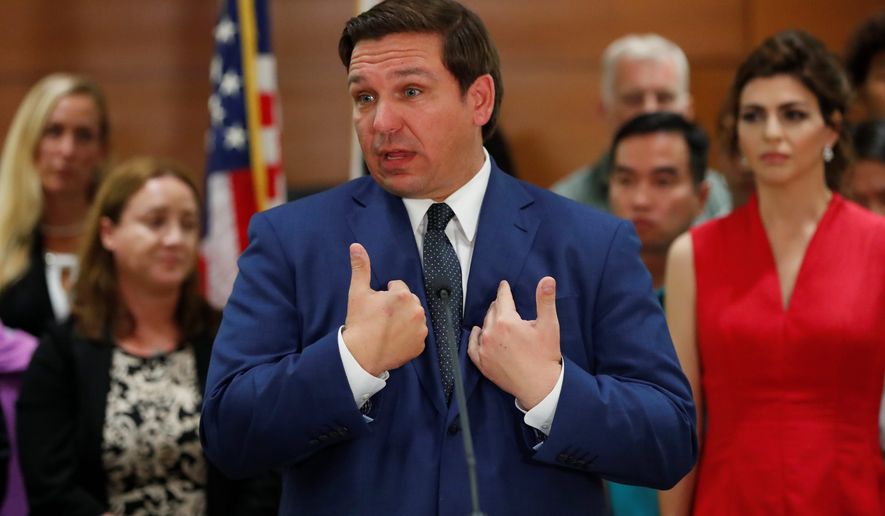Critics of Florida Gov. Ron DeSantis are quick to label him bad for the environment, most recently complaining that he surrendered to a court order allowing exploratory drilling in the iconic Everglades.
Turns out they were too quick.
In a last-minute move Wednesday, the DeSantis administration filed a court motion opposing a state appeals court’s ruling that granted a license for exploratory drilling in Miramar, a spot in the Everglades of western Broward County.
His move embarrassed the state’s Democratic Party, whose chair hours earlier had complained that Mr. DeSantis “destroyed any credibility he has on environmental issues” and continues a tradition of GOP governors afraid to embrace the green label.
While Mr. DeSantis does not appear to accept the argument that global warming will soon mark the end of days, he has taken steps to protect the Sunshine State’s water supply and wild spaces, while standing up to the powerful sugar lobby.
Last month, he announced his desire to pour another $1 billion into Everglades restoration projects during his term, which would mark a 66 percent boost to Florida’s spending on that goal.
“DeSantis came right out of the box promoting spending big on environmental issues,” noted Susan MacManus, Florida’s dean of political analysts.
His opening moves have caught the attention of environmentalists in the state.
“I wouldn’t say I’m surprised, but he’s definitely sending some signals,” said Diana Umpierre, who handles Everglades restoration projects for the Sierra Club. “We all wanted to hear about his opposition from him before the filing, but we certainly feel encouraged.”
The Sierra Club takes an absolutist position on new drilling in Florida, preferring to leave energy sources in the ground rather than fight running battles over sites, Ms. Umpierre said. The club would like to see Mr. DeSantis embrace a complete ban.
“Since Day One of his administration, the Governor has been clear that the protection of our environment and water quality is a number one priority,” his administration said in response to queries about his environmental moves.
Kanter Real Estate LLC would like to drill an exploratory well more than 11,500 feet deep into a shale formation a few miles south of Alligator Alley in Miramar in the Everglades. The company has testified it thinks it has roughly a 1-in-4 chance of hitting oil, possibly as much as 10 million barrels.
Environmentalists fret the drilling is close to the Biscayne Aquifier, a porous, limestone-laced system close to the surface that provides much of Miami’s drinking water.
The proposed well would be the first new drilling in the Everglades in decades. There are some scattered sites farther west in the legendary swamp, and exploration is ongoing, according to Ms. Umpierre.
The battle over the Miramar well has been going on for years. In 2015, the permit application was rejected by the state despite an administrative law judge ruling the area in question already was degraded environmentally and did not represent a threat to the water supply.
Kanter went to court and again won, when a three-judge panel of the First District Court of Appeal ordered the permit be granted on Feb. 5. The latest filing from the DeSantis administration objects to that decision and requests a hearing by the full court.
“Protection of the Everglades is of exceptional public importance because it affects residents of the State of Florida as a whole,” the administration argued in its filing.
Still, the appeal could hardly come as a surprise to those who have paid attention to Mr. DeSantis’s first weeks in office.
On Jan. 10, for example, Mr. DeSantis requested the resignation of the entire South Florida Water Management District, which had extended a lease with sugar manufacturer Florida Crystals that opponents said could have provided an agricultural reservoir.
That same day Mr. DeSantis unveiled his proposed $2.5 billion for Everglades preservation and announced a new position of chief science officer.
• James Varney can be reached at jvarney@washingtontimes.com.




Please read our comment policy before commenting.